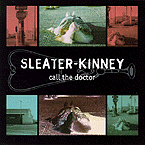 More Spin Accolades...
More Spin Accolades... 
 More Spin Accolades...
More Spin Accolades... 
As well as the "vital" designation, Sleater-Kinney also made the Spin year-end list of the best 20 albums for the years 1996 and 1997, which appeared in the January issues of the following years. Below are the year-end assesments, followed by the more in-depth original reviews.
 '96 - #18 - Tartly anthemic and convulsively sung,
this Olympia, Washington trio offers the Riot Grrrl of wised-up women;
the only "riots" incited here are between recieved history and the dream
of independence. In other words, the album wants/mocks rock & roll
with as much gorgeous ambivalence as [Pavement's] Crooked Rain, Crooked
Rain , only it's ten times more candid regarding the gender implications.
- Terri Sutton
'96 - #18 - Tartly anthemic and convulsively sung,
this Olympia, Washington trio offers the Riot Grrrl of wised-up women;
the only "riots" incited here are between recieved history and the dream
of independence. In other words, the album wants/mocks rock & roll
with as much gorgeous ambivalence as [Pavement's] Crooked Rain, Crooked
Rain , only it's ten times more candid regarding the gender implications.
- Terri Sutton
March, 1996 review - 8 out of 10 - Female rage is a new niche in today's partitioned pop world: MTV offers prepackaged tantrums from Dance Hall Crashers and No Doubt (whose ska madonna-wannabe frontwoman pouts because she's "just a girl"). Some might say Alanis Morrisette started the trend with her PJ-lite "You Oughta Know"; others might finger Hole's Live Through This. If feminism fuses the personal and the political, most of the above artists sacrifice politics for popularity. It's the transition from Riot Grrrl to X-Girl.
In this context, Sleater-Kinney's debut album (following a 1995 10-song mini-LP) is vital. Call the Doctor trades sex-worker role-playing, doll parts, gender-bending, and other common female-rock tropes for stories of everyday survival. These stories do have symbolism; comparing pickups to purchases, they refuse to make a sale. Yet Sleater-Kinney's anticommercial stance rages within compulsive songs. Singer/Guitarists Corin Tucker and Carrie Brownstein both hail from bands associated with riot grrrl - Tucker lead Heavens to Betsy, Brownstein was in Excuse 17 - but musically they've matured way past adolescence.
Sleater-Kinney proves that punk still offers new ways to say no. Australian singer/drummer Lora MacFarlane is intuitive and versatile; capped with click-sticks, her drumrolls stutter and surge as Tucker fights toward a line's painful conclusion. The high-low call-and-response of Tucker and Brownstein's guitars is echoed in the group's harmonies. Wilder than '60's girl-group cries, more intricate than '90's grrrl-band gang shouts, they work like a conversation between the voice in one's throat and voices in one's head.
Call the Dictor's starring voice is Tucker's.
"I'm not waiting/Till I grow up/to be a woman," she sneers at one point,
cramming years of definace, excitement, and fear into ten words; "Go out
on the lawn/Put your swimsuit on" Brownstein sneers back. As in their earlier
bands, both Brownstein and Tucker turn body trouble into a cultural indictment:
Tucker through surgical imagery, Brownstein by invoking heart attacks and
the binge/purge of bulimia. The "things" and "stuff" in songs like "Good
Things" and "My Stuff" function internally and externally, as feelings
and as belongings; Tucker's piercing, trembling tone bridges the physical
and the emotional. She has a drama queen's addiction to extreme passion,
but she means what she sings, and with time her range has grown. - Johnny
Huston
June, 1997 review - 9/10 - Platter du Jour - Nobody wants to be radical anymore.
On the right, radicals blow up family-planning clinics; on the left, they're shaggy '60's relics
and fat, hairy man-haters who destroyed feminism for regular women. Even as slang, "radical" seems
about as fresh as Pauly Shore in a pair of Bongo shorts.
Until you hear Sleater-Kinney. "Dig me out!" hollers Corin Tucker on the title track of the
band's new album. "Dig me in!/Outta this mess, baby/ Outta my head." Tucker's singing about how rock's
monstrous noise rips off her skin, leaving her unprotected and gloriously unbound. As guitarist
Carrie Brownstein turbocharges a riff rescued from Iggy Pop and David Bowie's "China Girl and drummer
Janet Weiss applies dominatrix discipline to her kick drum, Tucker alternately guides the music's
onslaught and gives in to it. She lets the songs' electric momentum strip her down to her emotional
core - a pure and antisocial humanity. From start to finish, Dig Me Out aims for this place
of undiluted emotion, where girlishness yields to the rage and joy of women who feel no need to
charm.
Nurtured in the pink petri dish of Olympia, Washington, where women's lib never went out of
fashion and punk meant the gentle triumph of nerdy kids, Sleater-Kinney seemed at first like a
glorious anomaly: politically radical artists whose rhetoric fuired them up instead of weighing
them down. Tucker's voice was one of those wonders of the world that turned listeners into
pilgrims; Brownstein drove her own path with raggedy-ass, blade-sharp guitar, and the songs
gleamed with quick eloquence. yet for all the harsh allure of their 1995 debut and last year's
Call the Doctor, Sleater-Kinney's music remained, for the most part, more no than
yes, a reaction against sexism instead of an attempt to imagine life beyond it.
On Dig Me Out, a rockin' little collection of love songs and catchy dance numbers,
Sleater-Kinney take the next step. Like the most radical feminist art, the album cuts into the
meat of women's everyday experience, aiming for depths untouched by the buttons-and-bows
(or nose-and-belly-button-ring) conventions that identify what's "feminine." This is not an easy
task in the pop world, where most female artists trade in these conventions, occasionally sassing
back, but ultimately staying within familiar boundaries. Many women assume they're liberated
because they can choose which fantasy to modify. But self-determination doesn't mean shit when
you didn't create the self you're determining. And one thing rock'n'roll's beat can offer is a
momentary sandblast that frees raw consciousness. When Tucker sings "I'll touch the sky and say
what I want," she knows that the music is what opens her mouth.
It takes chops to achieve such a visceral liberation, and Sleater-Kinney now own them fully.
Weiss, who joined the group last year, is both relentless and highly musical, and Brownstein has
grown dextrous on guitar: her twisted melodicism, which always got its energy from wiry riffs
instead of crunchy chords, is a full partner to Tucker's vocal aerobatics. Sleater-Kinney now
deliver the punch their words describe. "Words and Guitar" leaps and skitters with the
just-released repression of early Talking Heads; "Dance Song '97" uses a Farfisa for a new wave,
Day-Glo mood. Even "Little Babies," a fairly standard feminist protest against the maternity trap,
gets an added bite from a rock-reveling chorus ("All the little babies go one-two-three-four!").
Over chords that sound like the Clash taking a walk on the wild side, Tucker and Brownstein
giddily admit their own need to suck the mother's milk of the backbeat.
It's a blast to get charged up by Sleater-Kinney's suffragette rock, but Tucker and Brownstein
make their most surprisingly radical moves within love songs. Most address women, and this unqualified
declaration of lesbian desire immediately lifts them past typical wedding-bell romance. Both
fragmentary and painfully intimate, the songs avoid erotic platitudes, instead exploring sexual
longing in plain language. Tucker and Brownstein are listening to themselves, and what they discover
isn't simple. In the magnificent "One More Hour," the chorus counterposes Tucker's irrational
heartbreak ("I needed it," she insists, her pitch rising) against Brownstein's route rationalizations
and deadpan cliches. The argument ebbs and fades; it could be lovers feuding, or one friend
consoling the other, or the bereft Tucker split against herself. In this moment what emerges
is the clarity of partial vision, the understanding that who you are is a process, not reducible
to parts.
Dig me Out captures the noise of a soul-filled body shaking itself awake, and that's
an experience that bridges any gender divide. In it, guys as well as girls will hear the rattle
of their brains and the flash of their libidos. The catharsis Sleater-Kinney seek is more than
just fun; it's a battle in earnest for the human right to know and posess yourself. Feminism
was supposed to be about that fight, too, but it's still sputtering under the weight of its
own complacency. Sleater-Kinney push us back into the fray. If they wanna be our Simone de
Beauvoir, Dig Me Out proves they're up to it. - Ann Powers
 '97 - #3 - This Olympia, Washington punk trio rocked harder than
anything else in this not-very-rockin' year. But what you remember in the
end is how the (very) few bits of pop-song trimmings - handclaps, girl-group
choruses - absolutely chime. Singer/guitarists Corin Tucker and Carrie
Brownstein referred to "the little kiddies" with wary love and no sarcasm
in their hearts. And "One More Hour" was the realest lover's farewell anyone's
written in ages. - R.J. Smith
'97 - #3 - This Olympia, Washington punk trio rocked harder than
anything else in this not-very-rockin' year. But what you remember in the
end is how the (very) few bits of pop-song trimmings - handclaps, girl-group
choruses - absolutely chime. Singer/guitarists Corin Tucker and Carrie
Brownstein referred to "the little kiddies" with wary love and no sarcasm
in their hearts. And "One More Hour" was the realest lover's farewell anyone's
written in ages. - R.J. Smith
 |
|
* primer * write me * news * |